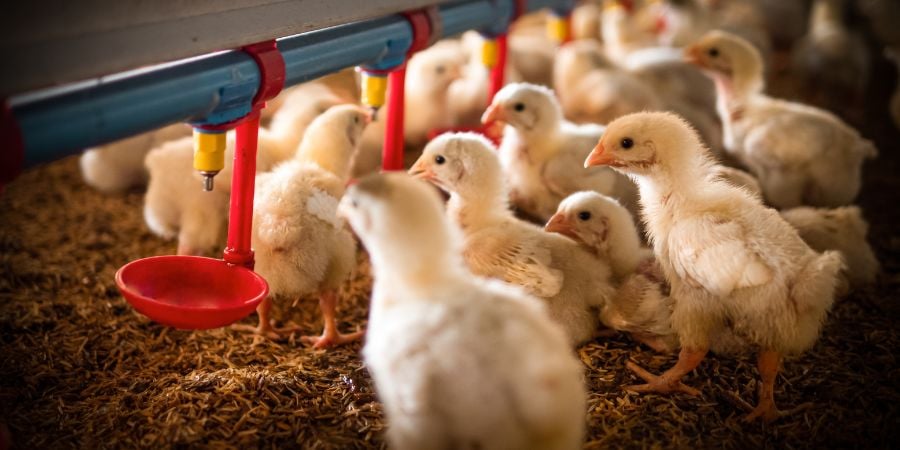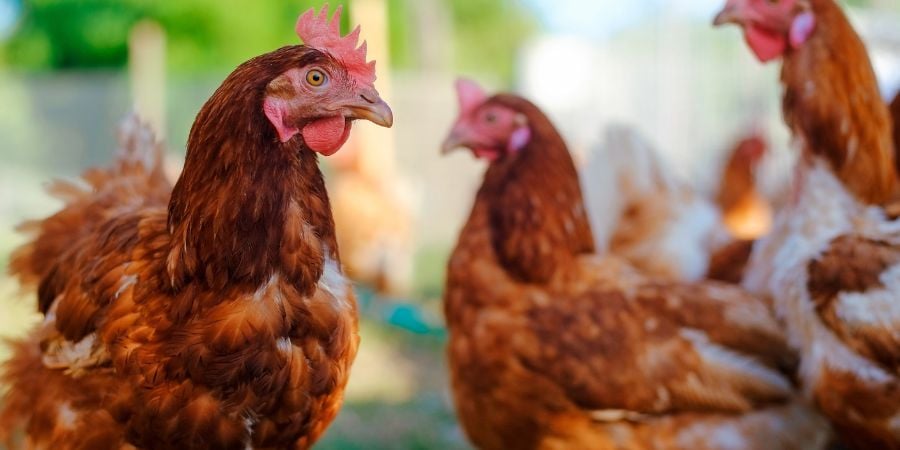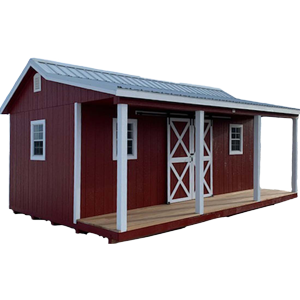Hydration Essential: Providing Water for Chickens and Their Well-being
by Dakota Storage Buildings, on January 24, 2024

Raising backyard chickens for fresh eggs is an increasingly popular activity among homeowners. As an up-and-coming chicken keeper, you might find yourself confused by the numerous responsibilities that come with poultry care. One of the critical aspects, often overshadowed by more visible needs like food and shelter, is ensuring that you provide water for chickens and keep them adequately hydrated. It is crucial to ensure your flock has a constant supply of clean, cool water because it plays a pivotal role in maintaining the health and productivity of your chickens. This blog can offer you insights and practical tips to ensure that your chickens stay hydrated, healthy, and happy. Whether you are dealing with the blazing heat of summer or the cold days of winter, understanding and meeting your chickens' hydration needs will be a key factor in the success of your backyard chicken venture.
Keeping Your Hens Well-hydrated
When raising backyard chickens, one crucial aspect that often flies under the radar is the importance of consistent and proper hydration for your flock. Hydration plays a pivotal role in the health and vitality of your chickens, influencing everything from their body temperature regulation to their egg-laying capabilities. As seemingly simple as it might appear, ensuring that your chickens have access to clean, cool water at all times is a nuanced task, particularly during the extreme temperatures of summer and winter. From understanding the dangers of dehydration and humidity to implementing effective strategies for water management, let’s explore the essential elements of keeping your chickens well-watered and healthy.
The Vital Role of Cool Water
The health and well-being of your backyard chickens are directly linked to their hydration. During the intense heat of summer, chickens face significant stress. Their water intake can surge by two to three times the usual amount. This dramatic increase underscores the importance of providing a constant supply of cool, clean water. Cold water acts as a critical heat sink within chickens' digestive system, effectively aiding in reducing their core body temperature. This is not just a comfort issue; it is a matter of health and survival, particularly during heat waves.
Practical Tips for Keeping Water Cool
Maintaining the coolness of the water can be surprisingly straightforward. A daily routine of adding ice cubes to their water can make a significant difference. This simple act can lead to numerous benefits, including enhanced egg production. Another method is to use shaded water stations or insulated water containers that help keep the water cool throughout the day. Remember, the cooler the water, the more likely your chickens will drink sufficiently, thereby staying hydrated and healthy.
Understanding the Danger of Humidity
Humidity can be a silent threat to your flock. Chickens, like humans, find it challenging to cool off in high humidity. The danger lies in the fact that humidity hampers the effectiveness of their natural cooling mechanisms. If you are using fogger systems to reduce temperature, be mindful of their impact on humidity levels. A system that creates a fine mist can help cool the air without significantly raising humidity. Also, ensure that these systems are used intermittently to avoid excessive moisture buildup, which can be counterproductive.
The Link Between Hydration and Egg Laying
Water is crucial for more than just temperature regulation. Egg production is directly linked to hydration. A dehydrated chicken will likely cease laying eggs as its body struggles to maintain normal physiological functions. Water is not just a thirst quencher; it is a vital component in the digestion process. It helps break down food, making nutrients, electrolytes, and vitamins readily available for absorption. This absorption is crucial for overall health and, specifically, for maintaining consistent egg production. The blood, which carries these nutrients throughout the body, is predominantly composed of water, emphasizing the need for constant hydration.
Observing Your Flock for Signs of Dehydration
As a chicken keeper, it is essential to observe your flock for signs of dehydration. These can include panting, lethargy, or reduced activity levels. In extreme cases, dehydration can lead to health complications or even be fatal. Regularly checking the water levels, cleanliness, and temperature of the water supply is a proactive step in ensuring the well-being of your backyard chickens. It is also a good practice to have multiple water sources available, especially for larger flocks, to ensure that all chickens have easy access to water.
There is No Such Thing As “Too Much” Water for Chickens

The phrase "no such thing as too much water" is particularly true when it comes to backyard chickens. A chicken's water requirements can vary significantly based on several factors, including the season, the size of the hen, and the external temperature. On average, a chicken drinks about a pint of water per day, but this amount can spike dramatically in hot weather. For instance, during peak summer days, with temperatures soaring above 90 degrees Fahrenheit, a chicken might consume up to a quart of water daily. This heightened water demand necessitates vigilant monitoring of their water supply to ensure that it never runs dry.
Chickens have a preference for fresh and clean drinking water. A neglected water source that has been sitting out for days, accumulating debris and possibly harboring bacteria pose health risks to your flock. To keep their water fresh it is important to change the water regularly and keep the containers clean. This is where the design and placement of the watering system come into play. Elevating the water source off the ground, either by suspending it from the coop ceiling or placing it on a raised platform, can significantly reduce contamination from feed, bedding, and droppings. Ideally, the water source should be positioned at the height of the shortest chicken's shoulder, making it easily accessible while keeping it clean.
In summer, the challenge is keeping the water cool enough to encourage the chickens to drink sufficiently. Adding ice cubes to their water or using containers that shield the water from direct sunlight can help keep the water at a refreshing temperature. Some chicken keepers use frozen water bottles or special water cooling systems to maintain an optimal temperature. Winter presents a different challenge: preventing water from freezing. Chickens need access to liquid water, not ice. It is crucial to have a system in place to prevent the water from freezing. Solutions range from using thermostatically controlled water heaters to insulated water containers. If relocating the water source inside the coop for warmth, one must be mindful of the potential mess and the increased humidity, which can lead to frostbite in chickens.
Add-ons for Enhanced Health
While clean, fresh water is crucial for maintaining the health of your backyard chickens, incorporating certain additives into their water can provide additional health benefits. These supplements range from apple cider vinegar to specialized chicken water protectors, and they serve various purposes, including boosting the digestive system and enhancing egg production. However, it is important to introduce these additives gradually to avoid disrupting the chickens' regular water consumption habits.
Apple Cider Vinegar for Digestive Health
Apple cider vinegar is a popular additive among chicken enthusiasts. It is known for its potential to improve digestive health and to create an acidic environment in the gut, which can be unfavorable for certain pathogens. When adding apple cider vinegar to your chickens' water, use raw, unfiltered vinegar with the 'mother' and ensure it is diluted properly (usually a ratio of 1 tablespoon per gallon of water). It is best to offer apple cider vinegar water in plastic or rubber waterers as apple cider vinegar can corrode metal.
Liquid Vitamins for Overall Well-being
Liquid vitamins can be a great way to supplement your chickens' diet, especially during times of stress, molting, or when recovering from illness. These vitamins often include essential nutrients that might be lacking in their feed, especially if they are on a limited or unvaried diet. When introducing liquid vitamins, follow the manufacturer's instructions carefully to avoid over-supplementation, which can be harmful.
Electrolytes During Heat Stress
Electrolytes are vital, especially during hot weather or periods of stress. They help in maintaining fluid balance and support various physiological functions. Electrolyte supplements can be particularly beneficial during the summer months or in any situation where chickens might be at risk of dehydration. These supplements can help replenish lost minerals and maintain hydration, ensuring that your chickens stay healthy and active.
Keeping Your Chickens Healthy All Year Round
Hydration, electrolyte balance, and nutrition are intertwined and crucial for your chickens' health and productivity. While chickens may not be overly fussy about their water source, striving to provide clean, fresh water for chickens is essential to prevent illness and maintain productivity. Proper hydration aids in digestion, nutrient absorption, and egg production, and it plays a crucial role in regulating body temperature. Managing your chickens' water supply effectively is a form of preventive care. By keeping the water clean, at the right temperature, and easily accessible, you can prevent numerous health issues. As a chicken keeper, your learning journey never truly ends. Each season brings its own set of challenges and learning opportunities. The more informed you are, the better care you can provide for your flock. If you are raising backyard chickens for the first time, we encourage you to download our free resource, “The Beginner’s Guide to Raising Backyard Chickens.”

























